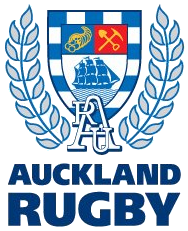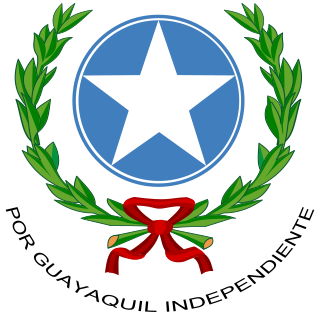
The coat of arms of South Africa is the main heraldic insignia of South Africa. The present coat of arms was introduced on Freedom Day, 27 April 2000, and was designed by Iaan Bekker. It replaced the earlier national arms, which had been in use since 1910. The motto is written in the extinct |Xam, member of the Khoisan languages, and translates literally to "diverse people unite". The previous motto, in Latin, was Ex Unitate Vires, translated as "From unity, strength".
Flag terminology is the nomenclature, or system of terms, used in vexillology, the study of flags, to describe precisely the parts, patterns, and other attributes of flags and their display.
The following lists events that happened during 1995 in South Africa.

The current coat of arms of Venezuela was primarily approved by the Congress on April 18, 1836, undergoing small modifications through history, reaching the present version.

Rugby union in Scotland is a popular team sport. Scotland's national side today competes in the annual Six Nations Championship and the Rugby World Cup. The first ever international rugby match was played on 27 March 1871, at Raeburn Place in Edinburgh, when Scotland defeated England in front of 4,000 people. Professional clubs compete in the United Rugby Championship, European Rugby Champions Cup and European Rugby Challenge Cup, while the Scottish League Championship exists for over 200 amateur and semi-professional clubs, as does a knock-out competition, the Scottish Cup. The governing body, the Scottish Rugby Union (SRU), is one of the ten first-tier member nations of World Rugby.

Rugby union in Australia has a history of organised competition dating back to the late 1860s. Although traditionally most popular in Australia's rugby football strongholds of New South Wales, Queensland and the ACT, it is played throughout the nation.

Portuguese heraldry encompasses the modern and historic traditions of heraldry in Portugal and the Portuguese Empire. Portuguese heraldry is part of the larger Iberian tradition of heraldry, one of the major schools of heraldic tradition, and grants coats of arms to individuals, cities, Portuguese colonies, and other institutions. Heraldry has been practiced in Portugal at least since the 12th century, however it only became standardized and popularized in the 16th century, during the reign of King Manuel I of Portugal, who created the first heraldic ordinances in the country. Like in other Iberian heraldic traditions, the use of quartering and augmentations of honor is highly representative of Portuguese heraldry, but unlike in any other Iberian traditions, the use of heraldic crests is highly popular.

The Eastern Province Elephants are a South African rugby union team that participates in the annual Currie Cup and Rugby Challenge competitions. They are governed by the Eastern Province Rugby Union. The team represents the Western half of the Eastern Cape province, and they play their home games at the Nelson Mandela Bay Stadium in Port Elizabeth.

The Auckland Rugby Union is a New Zealand provincial rugby union. The union was established in 1883 and was originally responsible for the administration of the sport in most of the former Auckland Province, although its boundaries have since shrunk to include only a portion of the Auckland urban area. The union governs the Auckland representative team, which has won New Zealand's first-tier domestic provincial competition 17 times, more than any other team. Their most recent title was the 2018 Mitre 10 Cup Premiership. The union administers all club rugby within its boundaries, including the Gallaher Shield and other senior club rugby, as well as school rugby. Auckland also acts as a primary feeder to the Blues, who play in the Super Rugby competition.
The World Rugby Rankings is a ranking system for national teams in rugby union, managed by World Rugby, the sport's governing body. There are separate men's and women's rankings. The teams of World Rugby's member nations are ranked based on their game results, with the most successful teams being ranked highest. A point system is used, with points being awarded on the basis of the results of World Rugby-recognized international matches. Rankings are based on the team's performance, with more recent results and more significant matches being more heavily weighted to help reflect the current competitive state of a team. The men's ranking system was introduced the month before the 2003 Rugby World Cup, with the first new rankings issued on 8 September 2003, when they were called the "IRB Rankings".

The Wellington Rugby Football Union are a New Zealand governing body of rugby union in the New Zealand province of Wellington Region. The main stadium is Sky Stadium which is located in Wellington. The union also represents the Wellington Lions, which is professional rugby union team who compete in the Mitre 10 Cup competition and contest for the Ranfurly Shield. Before 2006 the Lions competed in the National Provincial Championship.

Ebbw Vale Rugby Football Club is a Welsh Rugby Union Club based in the town of Ebbw Vale, Blaenau Gwent, South Wales.
Visser is a Dutch occupational surname, meaning "fisherman". In 2007, nearly 50,000 people in the Netherlands carried the name, making it the eighth most populous name in the country. Common variant forms of the name are De Visser, Visscher, and Vissers.
David Booysen was a South African Afrikaner professional rugby league footballer who played in the 1920s. He played at representative level for Other Nationalities, and at club level for Wigan, as a centre, or scrum-half, i.e. number 3 or 4, or 7. David Booysen played for Wigan in the same era as fellow South African Afrikaner Attie van Heerden.

Mind Sports South Africa (MSSA) is recognised by Act of Parliament as the national controlling body for mind sports in South Africa.
The Bill Beaumont County Championship Division 2 is an annual rugby union competition in England between teams representing English counties. It was formed in 2002 as the County Championship Shield - changing to Plate by 2010 and then to Bill Beaumont Division 2 by 2017. Division 2 is contested for by second tier teams in the RFU County Championship. Each county draws its players from rugby union clubs from the third tier and below of the English rugby union league system.
Fabian Connal Frazer Booysen is a South African professional rugby union player who last played for the SWD Eagles in the Currie Cup and Rugby Challenge competitions. His regular position is flanker or number eight.
The 2018 RFL League 1 was a professional rugby league football competition played in England and Wales and is the third tier of the sport for Rugby Football League (RFL) affiliated clubs.

The coat of arms of Guayaquil is used for the Ecuadorian city of Guayaquil. Adopted in 1920, it's composed of a circle in blue with an inscribed silver star. The circumference is surrounded on both sides by two olive branches in the shape of a crown, linked at the bottom by a ribbon of gules. Under the ribbon is the slogan "Por Guayaquil independiente". It usually appears with an oval border in blue, although this is not an official version.

The 2022–23 EPCR Challenge Cup was the 9th edition of the EPCR Challenge Cup, an annual second-tier rugby union competition for professional clubs. Including the predecessor competition, the original European Challenge Cup, this is the 27th edition of European club rugby's second-tier competition.












